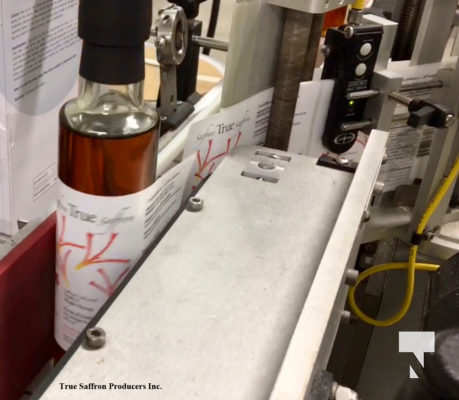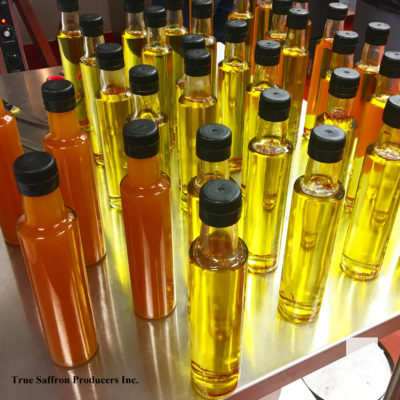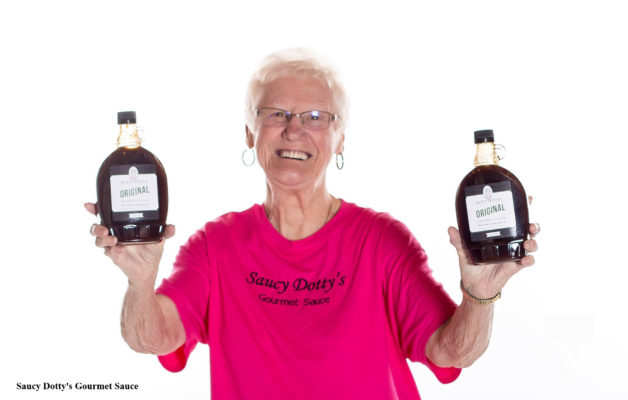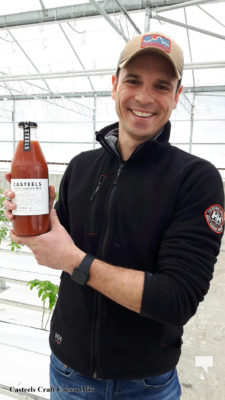Cecila Nasmith/Today’s Northumberland
Have you recently picked up a bottle of Casteels Craft Caesar Mix at your local Foodland and wondered how such a delicious locally-made product came to be?
The answer lies in a combination of entrepreneurial spirit and community economic development.
The Northumberland Community Futures Development Corporation (Northumberland CFDC) in partnership with the Business and Entrepreneurship Centre of Northumberland (BECN) and Northumberland County launched an 18-month Northumberland Agri-Food Fund pilot program in 2017. The focus of the pilot was to support “agripreneurship” (agricultural entrepreneurship), providing entrepreneurs with access to micro-grants and strategy services, as well as coaching and mentoring.
“The Agri-Food Fund Northumberland is another stellar example of how the Business and Entrepreneurship Centre drives innovation and real job growth in Northumberland through planning, training, coaching, mentoring and micro-grants,” Northumberland County Director of Economic Development and Tourism Dan Borowec stated.
“The matching financial contribution of Northumberland CFDC embraces the county vision of people, partnerships and possibilities.”
So what has happened since the pilot program was launched?
Vince Mosher’s Bzy Bnny Rabbitry in Campbellford, for example, can now breed stock year-round with optimum results, thanks to health and disease-control measures that were enhanced with the new geothermal system he was able to install with the support of the Agri-Food Fund.
Nick and Erin Cluley, owners of the Coffee Public cafe in Port Hope, advanced the development of Northumberland Eggs, a custom egg-grading station. The station increases local organic egg-production capacity and expands market-access potential for local organic producers.
Linda and Tony Armstrong had their rural dreams come true when they set up the Headwaters Community Farm and Education Centre in Hamilton Township. The Agri-Food Fund supported the development of their educational facility with kitchen equipment, as well as offering marketing help and interpretive and wayfinding signage to enhance the experience of visitors – whether they are enjoying a farm tour around the gardens and pastures (perhaps rolling up their sleeves to harvest vegetables or milk a goat) or other unique activities (such as yoga, food preparation workshops, wild-crafting or beekeeping).
Adam Thomson of Campbellford was able to purchase and install an automated irrigation system to service two acres of hops production (with the potential to grow to five acres) at a time when start-up help is paramount in a new business. While hops require a consistent source of water, Thomson explained, they also cannot tolerate “wet feet.” These demands can now be met by an irrigation system that controls water distribution and maximizes yield. Now his Lot 17 Hop Yard is working with Ottawa’s Dominion City Brewing Co, and Campbellford’s Church-Key Brewing Co. (with whom he is collaborating on a beer to be entered in the Great Ontario-Hopped Craft Beer Competition.
Brighton-based Number E Tea Company is owned by Sarah Pelletier and Chris Auger-Jalbert. Pelletier got her certificate as a tea sommelier and conceived an unusual approach to her art. Instead of opening a shop, she and Auger-Jalbert started a tea bar at the Wellington Farmers Market in adjacent Prince Edward County. The Agri-Food Fund enabled the production of niche organic artisan teas with a nitrogen brewing system (not to mention the purchase of taps and kegs for the tea bar). Now, in addition to their micro-steepery, their tea is sold from Toronto to Wellington – and is on the menu in such locations as Port Hope’s Coffee Public, Lola’s Coffee House in Brighton, The Grind Cafe in Trenton and Our Lucky Stars in Warkworth.
Tom Casteels of Centreton was well established with the family business – Casteels Greenhouses, which has grown outstanding tomatoes since 1985. But costs rise each year, putting pressure on the business to increase productivity and invest in innovation. Noting opportunity in seasonal surplus, Casteels set out to create a value-added product. And just before Christmas, Casteels Craft Caesar Mix hit the shelves in Colborne and Cobourg Foodland stores.
This spin-off business is in its infancy, Casteels said, but Christmas sales did amount to something like 70 cases of the product.
His first approach to developing Casteels Craft Caesar Mix was to explore opportunities at the Ontario Agri-Food Venture Centre (OAFVC) in Colborne. The Agri-Food Fund made it possible to pursue the project with OAFVC and take the Caesar Mix all the way from the idea stage to market validation.
“It absolutely made a difference,” he stated.
“It absolutely reduced the risk involved,” his father Alfons added.
Hiccups invariably happen along the way, he said, and you question whether to continue. But with the support of the program, “we were able to put our cards on the table and moved forward.”
Armed with program funding, Tom Casteels was able to purchase supplies and lease the OAFVC facilities: the test kitchen, the freezers, and the services of chef Emilio Ojeda in developing a savoury concoction that he finds quite tasty (even when served ice-cold with no alcohol).
It was hundreds and hundreds of hours of work, he estimated, but well worth the results.
In nearby Brighton, septuagenarian Dorothy Worobetz had secretly longed to market the gourmet sauce that she had served for years to friends and family, but encountered skepticism when she mentioned the ideas to others who worried about business risk.
Asked what the Agri-Food Fund pilot program had done to encourage her to make the leap, she had one word – “everything.”
“I have to thank them for everything, and I still do. I was very fortunate – they did so much for me. I can’t say it any other way.”
Saucy Dotty’s gourmet sauce is now on store shelves with distribution from Markham to Belleville, and that could not have happened without funding from Northumberland CFDC, product development at the OAFVC and up-to-date marketing expertise from BECN – all made possible by the Agri-Food Fund pilot program grant – that virtually transformed a talented chef into a powerhouse saleswoman.
Worobetz never misses an opportunity, from a recent tasting at Sharpe’s Foodland in Campbellford to personal sales pitches she made to staff during a hospital stay (with both individual bottles and 3.2-litre buckets sold). Worobetz’s business is humming.
Saucy Dotty’s comes in three varieties -Sweet (mild), Original (with a bit of a bite) and Extreme (with a big bite) – and “goes on everything.
“Veggies, potatoes, rice, every kind of meat, so many things you can put this sauce on,” she listed.
“They make beans with it once a month at the breakfast at Brighton Legion, and they usually run out about half-way through.”
Saucy Dotty’s website includes downloadable recipes, and Northumberland consumers can find it available at fine stores like the Village Pantry in Warkworth and Herma’s in Port Hope.
“She’s one of my top sellers! Eighty-five cases in four months,” she said.
Worobetz is now concentrating on getting on the menu in local bars and restaurants. The Whistling Duck in her home town is developing new dishes with her sauce.
For Angela Roest and Yves Thomas of Warkworth, equipment acquisition made possible by Northumberland CFDC funding through the pilot project has led to major wins.
The owners of Centre & Main Chocolate Company said that the freeze-dryer they purchased revolutionized their business, enabling the production of an exquisite gourmet line of chocolate bars infused with flavours that reflect the region, such as local crab apples and grapes. Yes, even chocolate has terroir.
Roest just returned from the first Winter Chocolate Show in Toronto, where she gave a presentation called Bringing Chocolate Home. She described apprentice days when she would add exotic fruits like mangoes to her chocolate. Now they prefer rhubarb, apples, blackberries and other fruits one finds at local markets here in Northumberland County.
“I came to realize there was nothing inherently better or more appropriate for blending with chocolate,” she said. But first she had to overcome a roadblock: fruits and vegetables are water-based, she explained, while chocolate is cocoa-butter-based – “one of the good fats,” she said. Unfortunately, water and fat do not blend, and she wanted to avoid the artificial flavouring sometimes seen in the industry. The key was to remove the moisture from the fruits.
Simple dehydrating did not work. She could use the dehydrated fruits in chunks as an addition, but could not achieve the superior blended characteristic she was looking for.
“With Northumberland CFDC support, I was able to get a grant that allowed me to purchase my own freeze-dryer. I can buy food from the farmers’ markets around here and freeze-dry it myself. It really allows me to support local foods and create a taste of place in my chocolate in a way that would be impossible otherwise, that has allowed me to stand out in my business,” she said.
“In order to do something different, I needed this very specialized tool. I would never have been able to go this far without it.”
It also allowed Roest to create winning entries for the Canadian edition of the International Chocolate Competition. She chose four of her best bars, expecting only feedback on how she might improve. Instead, she came home a multiple award-winner with three silvers and one gold.
The gold-medal entry was an affogato bar based on the ice-cream-and-espresso Italian dessert. She freeze-dried local ice cream and locally roasted Fair Trade coffee beans from Warkworth’s Our Lucky Stars cafe.
The silvers included a blood-orange-and-rosemary bar (with rosemary from The Humble Herb), a black-currant bar (with currants from Popham Lane Farm in Brighton) and a strawberry-rhubarb-saffron bar (all three ingredients sourced locally, with the saffron the only Northumberland grower, True Saffron of Warkworth).
Martin Albert, who owns True Saffron with Eric Charbonneau, is also familiar with what strategic funding from Northumberland CFDC can do. Their Eastern Ontario Development Program (EODP) was there to help in the initial development of their saffron crop. While may believe the best saffron comes from Iran or Spain, the International Organization for Standardization testing of the True Saffron crop ranks it beyond Grade 1 level, potentially placing it with the best in the world.
Once they began working with the OAFVC in exploring value-added saffron products, Chef Ojeda steered them back to the Northumberland CFDC and the Agri-Food Fund pilot program.
“It was transformative for our business in the sense that we are now placed in five Northumberland and Peterborough businesses. We have our saffron syrup, we have our jelly, our crab apple jelly, maple syrup, mustard, hot sauce and our two vinegars,” Albert listed.
They were delighted with the Northumberland CFDC’s user-friendly funding process, he added – a convenient PDF form and an instant answer when they had questions while filling it out.
Northumberland consumers are now beginning to understand the importance of thinking local and buying into the concept. This is a big boost for value-added products that ultimately allows them to crack into bigger markets, he said, but that all-important local support was crucial. The Agri-Food Fund pilot program is making a difference in allocating funding to high-potential business opportunities that are enhancing agripreneurship in Northumberland County.
“Northumberland CFDC allows people form Northumberland County to really step up. It’s a really important program. Without it, we would still be just producers – which is wonderful, but it’s just not enough to sustain a business. The Northumberland CFDC has literally been transformative. It has benefited us 100%. They are very supportive – if you have any questions, you can just ask, and there’s never any surprises or hidden paperwork.
“To have that in conjunction with the OAFVC in the same county literally steps up the game for us,” Albert said.
In total, nine participants benefited from the Agri-Food Fund Pilot and the value-added services provided by both the Northumberland CFDC and the Business & Entrepreneurship Centre Northumberland.
“We designed this local pilot program to fill a gap in resourcing and funding for early-stage agripreneurs who wanted to innovate in Northumberland or to work with the Ontario Agri-Food Venture Centre, for whom this project has contributed significant revenue and momentum,” said Northumberland CFDC executive director Wendy Curtis.
“Working together, we can achieve critical mass and capitalize on our incredible potential.”
The future is bright for local value chains in the agri-food sector. The County can certainly be proud of the entrepreneurial creativity and flair of our agripreneurs, as well as the organizations – like Northumberland CFDC, the OAFVC and the BECN – who support them in bringing great ideas to market.































